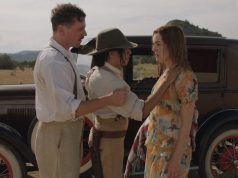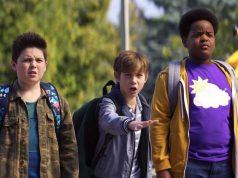“I don’t know who I am when we’re not us!” cries Marina (Anna Friel) in Sandra Goldbacher’s “Me Without You,” a piercing examination of poisonous friendships and the reasons we persist with them.
Who Marina is without Holly (Michelle Williams) is a mystery; indeed, the two make little sense without each other. And yet, they are remarkably bad for one another, Marina being too free-spirited and dangerous and Holly being too neurotic and careful. In a musical comedy, they would sing a jaunty friend song like “We’ll Always Be Bosom Buddies” or “We’re Gonna Go Through It Together.” In the somber drama of this film, though, they quarrel and reconcile repeatedly.
After scenes set in 1973 and 1978, on the outskirts of London, we come to 1982, where the lifelong friends and next-door neighbors are college students pursuing the same American professor, Daniel (Kyle MacLachan), who has no idea what he’s getting himself into. Marina, the daughter of a broken home that includes a wandering father (Nicky Henson) and a hard-drinking showgirl mother (Trudie Styler), is too uncultured for the likes of Daniel. Holly, the nice Jewish girl with utterly devoted parents, is quite smart but too talkative and worried. The fact that Daniel sees them both will be trouble.
There is other trouble, though, in the form of Marina’s brother Nat (Oliver Milburn), whom Holly has had a crush on forever, culminating in a brief fling before he took off for France. He’s back now, just as things with Daniel are boiling. Trouble, trouble, trouble.
The coming-of-age melodramatics employed here are fairly standard, but there is treasure in the intensely intimate friendship shared by these women, which I think men cannot entirely relate to. The consequences of such a close association are presented in all their histrionic glory, acted with pitch-perfect insight by Friel and Williams.
Goldbacher co-wrote the screenplay with Laurence Coriat, who also wrote Michael Winterbottom’s similarly brooding “Wonderland” (1999). Goldbacher’s direction here is impressive, pointedly evoking everything from hazy mid-’70s daytime drug-and-sex parties to mid-’80s Depeche Mode-centered dance clubs.
For my tastes, the film wraps itself up too quickly, though the repercussions of what’s shown to us in the end are fascinating to consider. How can a friendship so caustic — and yet so vital to the happiness of either party — ever truly end? One suspects that no matter what, they’ll always be bosom buddies.
B+ (1 hr., 36 min.; )





